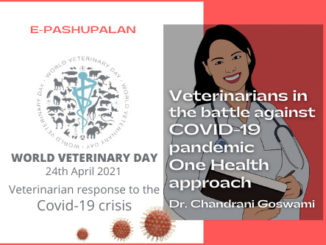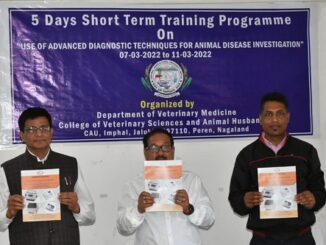Introduction
At this moment in time, the world is fighting against the pandemic caused by novel Corona virus known as COVID-19 (Corona Virus Disease -2019) or SARS-CoV2 (Severe Acute Respiratory Syndrome – Corona virus 2) which was first reported in Huanan Seafood Wholesale market of Wuhan, capital of Hubei province of China in December 2019 & due to inadequate conditions for hygiene and food safety, the virus gets transmitted from it’s intermediate hosts to humans and had spread globally in an acute phase of time. It was named as SARS-CoV2 because an outbreak had already occurred due to corona virus in 2002-2003 named as SARS-CoV. This outbreak was declared as Public Health Emergency of International Concern (PHEIC) by WHO on 30th January, 2020 & on 11th March, 2020, the COVID-19 disease was declared as Pandemic, as 114 countries were already infected by that time.
SARS-CoV2 is +ve sense single stranded RNA (+ssRNA) virus belonging to the Order Nidovirales, Family Coronaviridae, Sub-family Orthocoronavirinae, Genera Betacoronavirus. This virus affects the upper respiratory system (sinuses, nose & throat) & lower respiratory tract (trachea & lungs)
The governments of different countries are adopting different ways to prevent the spread of novel Corona virus due to its ability to rapidly spread via human-to-human contact. It has caused huge loss to human lives worldwide as well as to world’s economy. The deployment of frontline workers which include medics, paramedics, veterinarians, sanitary workers, police officials have helped either directly or indirectly to reduce the spread of this virus. The determination of origin or source of virus have been made possible due to collaborative work between epidemiologists, veterinarians, medics, zoologists and environmentalists which made it possible to early prevention of transmission of virus from animals to humans. This collaborative work also thrown strong light on “One Health Concept” which shows how veterinarians, medics and environmentalists can work in collaboration to each other to tackle conditions like such pandemic. “One Health Concept” highlights the relation between Human, animal & Environmental health i.e. Host, Agent & Environment. A Veterinarian is an integral part of the global community of health professionals and plays a key role in the prevention and control of disease. As a veterinarian, having proper knowledge and understanding of zoonotic diseases, he/she is able to do a better job in preventing the spread of corona virus.
As a Veterinarian, services which he/she can provide are
- Providing direct-to-house services: During normal times when pandemic was not there, people used to come to veterinary hospitals with their animals for their treatment which led to gathering of crowd in a smaller area. During the pandemic, veterinarians started to provide services to the houses of animal owners in order to avoid unnecessary gathering in the hospitals, thus preventing spread of novel Corona virus.
- As an extension worker: A field veterinarian is also an extension worker who can educate people about the COVID-19 disease, measures to be taken to prevent it’s transmission and how to avoid being infected.
- Conducting mass awareness program via means of social media tools: As a veterinarian having more people connected to them mostly of which includes farmers and livestock owners and to a less extent pet owners, he/she can aware people on a comparatively larger scale by means of social media tools without gathering people at one place which is an advantage to population and the government in concern to spread of virus.
- Providing over the call services: During pandemic, when restrictions were there on outside movement of people except in emergency cases, services were provided on the call to the pet and livestock owners on how to treat sick animals at home with medications or with the general in-house ingredients. e.g.: Mixture of Chamomile + Peppermint + Ginger is effective in treatment of colic in horses.
As a Public Health Veterinarian, services which can be provided include
- As a Veterinary Public Health Researcher: As a Veterinary Public health researcher under the “One Health Concept”, fields of research include:
a) Zoonotic transmission between animals and humans;
b) Reverse-zoonotic transmission between humans and animals;
c) Selection of suitable animal model for development of vaccine;
d) Determining potential risk to animals and their owners and;
e) Emerging zoonotic diseases. - The context of Emerging Zoonotic Diseases: Most of the emerging diseases are zoonotic in nature with animals as their primary reservoir and subsequent transmission to humans via contact. Most common examples include SARS-CoV, SARS-CoV2, MERS-CoV, Ebola virus, Nipah virus, Hendra virus, West Nile virus, Chikungunya virus. Zoonotic nature of these diseases makes a veterinarian of paramount importance in their control & prevention measures.
- Amid the pandemic, there was restrictions on movement of goods from one place to other which also included daily food items leading to nutrition rich food deficiency among population. At that point of time, milk and other dairy products were the only nutrient rich items present in plenty for consumption which was possible because of better Animal husbandry services provided by the veterinary public health workers, who ensured safe and hygienic milk production and milk products’ quality for human consumption.
Other fields of Veterinary contribution include
- Genome decoding of SARS-CoV2: It was done at Gujarat Biotechnology Research Centre (GBRC) under the leadership of Dr. C.G. Joshi, who is a veterinarian by profession.
- Selection of suitable animal model for development of vaccine: Animal models which are used are: Ferrets, Golden Syrian Hamsters & Monkeys.
- Development of COVID-19 vaccine: Animal models which are used to evaluate the efficacy of vaccine are kept under supervision of veterinarian.
- Testing the efficacy of antiviral drugs: Remedesivir, an antiviral drug is tested for its efficacy in Monkey model against SARS-CoV2 infection.
- Management of Health Aspects of Lab Animal Facilities & Diagnostic laboratories: Recognition of various resurgent diseases and development of various novel therapeutics have imparted challenging conditions to maintain various laboratory animal colonies which falls to the veterinarians.
- Veterinarian as an Epidemiologist: Epidemiologist focus on zoonotic diseases and their outbreak in animals. As an integral part of “One Health Concept”, their duty is monitoring, controlling and prevention of disease in animals in order to avoid it’s transmission to humans in case of zoonotic diseases.
- Veterinarians in wildlife surveillance: As wildlife is a fundamental parameter in emerging zoonoses because of ecological changes, a veterinarian is important in wildlife surveillance.
- Recently, use of sniffer dogs to identify corona virus infected humans by training them with a greater accuracy rate also adds to importance of veterinarian
Conclusion
Veterinarians are already providing a hand to fight COVID-19 either directly or indirectly but are still underrecognized. This COVID-19 pandemic is an opportunity where veterinarians can proclaim their importance & contend themselves as foreperson in “One Health Concept” by wading in fields like food safety & hygiene, food security, navigating the SARS-CoV2 pandemic and preventing such future pandemics. This pandemic could increase demands for services like increased food security and control on zoonotic infections and therefore can provide a opportunity for veterinarians to divulge







Be the first to comment